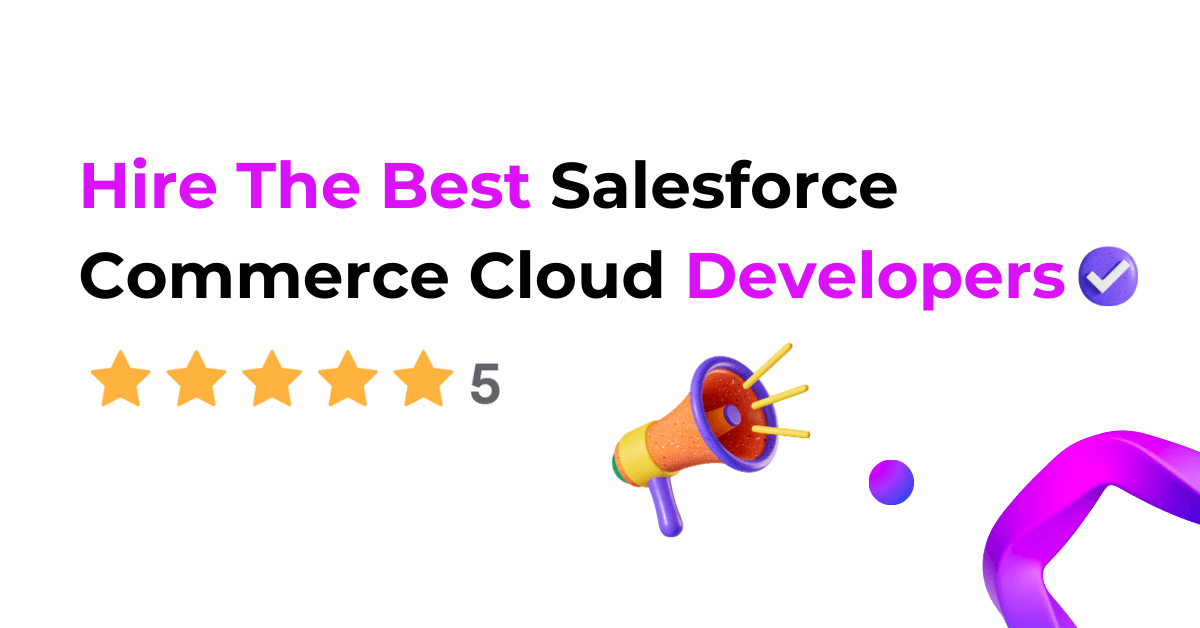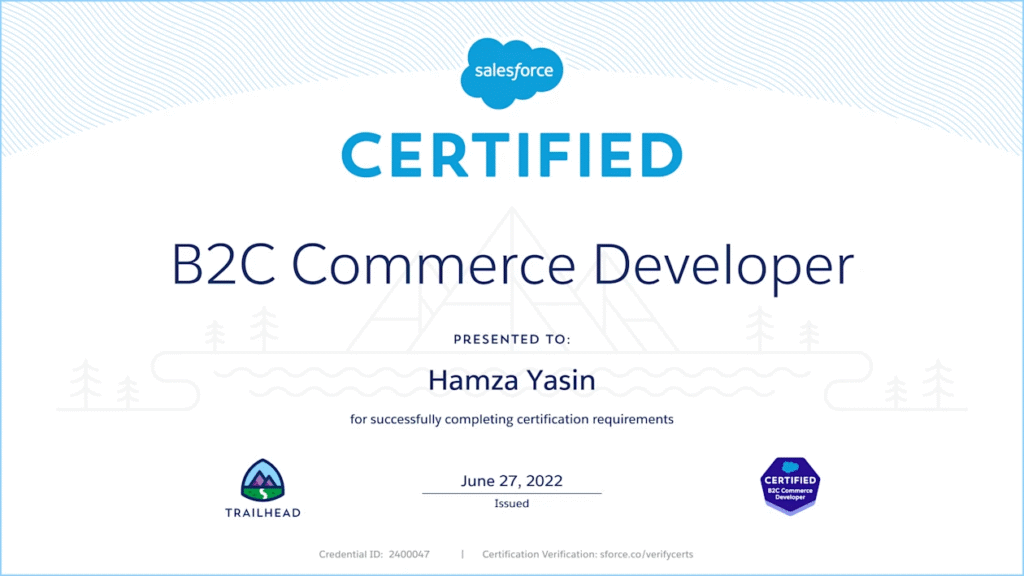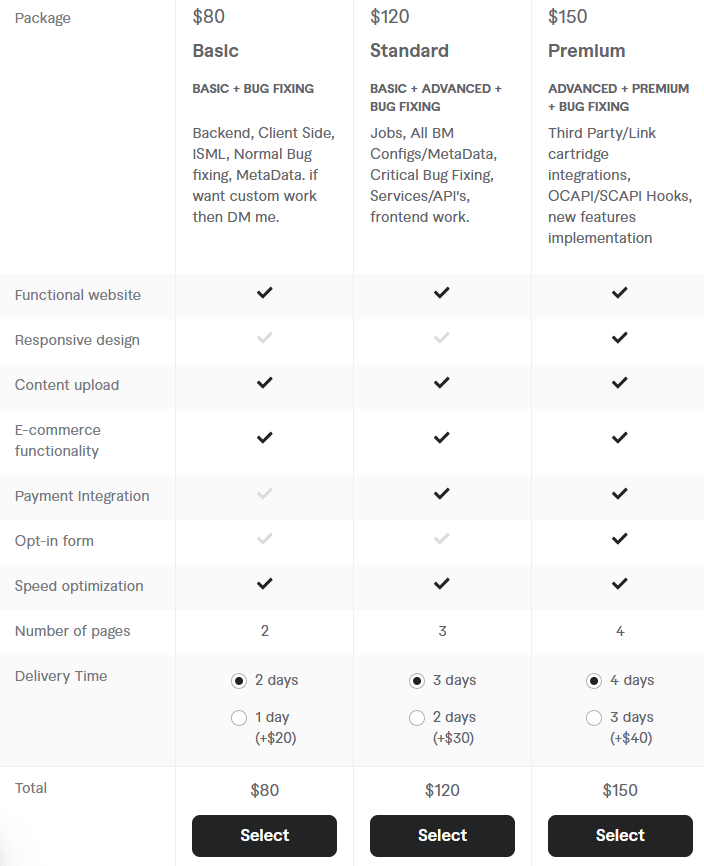In the fast-paced world of e-commerce, choosing the right platform is crucial, but hiring the right developer can make or break your success. Salesforce Commerce Cloud (SFCC) is a powerful, enterprise-level ecommerce solution trusted by global brands for its scalability, flexibility, and seamless customer experiences. However, to unlock its full potential, you need a highly skilled Salesforce Commerce Cloud developer who understands the platform’s intricacies and can tailor it to your business goals.
Whether you’re launching a new digital storefront, optimizing your current online store, or integrating complex third-party tools, hiring the best SFCC developer ensures your project runs smoothly and delivers measurable results. In this guide, we’ll walk you through everything you need to know—from understanding what Salesforce Commerce Cloud offers to where and how to find the most qualified developers online.
Table of Contents
What is Salesforce Commerce Cloud?
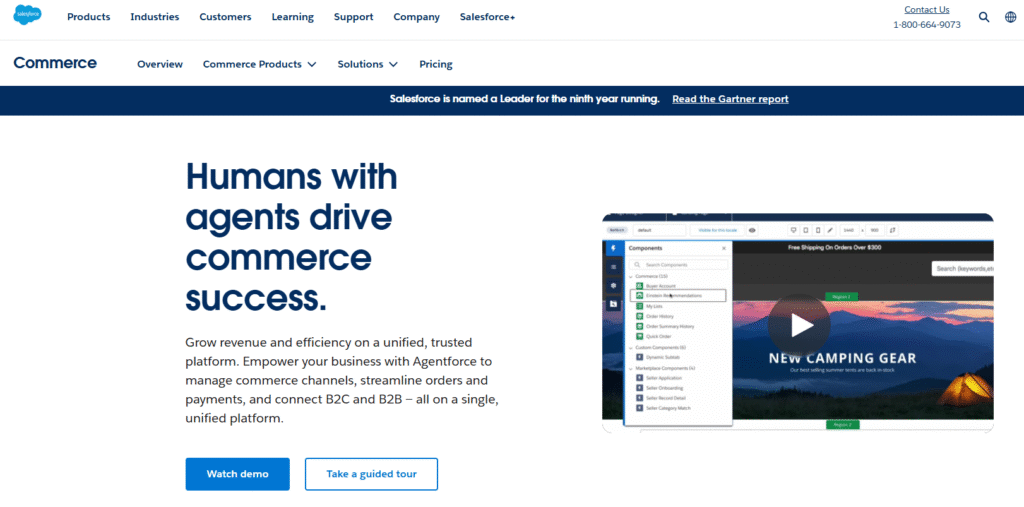
Salesforce Commerce Cloud (SFCC) is a powerful, cloud-based e-commerce platform designed to help businesses deliver seamless and personalized shopping experiences across all digital channels. Originally known as Demandware before being acquired by Salesforce, SFCC is now a leading choice for enterprise-level ecommerce solutions.
At its core, Salesforce Commerce Cloud enables brands to manage every aspect of their online store — from product listings and pricing to promotions, content, and customer interactions — all from a centralized platform. It is known for its flexibility, scalability, and AI-driven features that help businesses increase conversions and enhance customer satisfaction.
Key Features of Salesforce Commerce Cloud:
- Unified Commerce: Manage digital storefronts, mobile experiences, and in-store data in one ecosystem.
- AI Integration (Einstein): Built-in artificial intelligence provides smart product recommendations and personalized search results.
- Omnichannel Experience: Ensures a consistent customer journey across desktop, mobile, and physical stores.
- Cloud Scalability: Effortlessly handles traffic spikes during sales, holidays, or promotions.
- Customization & Extensibility: Developers can build custom cartridges, integrate APIs, and create tailored shopping features.
Salesforce B2C vs. B2B Commerce
Salesforce Commerce Cloud is divided into:
- B2C Commerce: Designed for brands selling directly to consumers, with features like merchandising, A/B testing, and real-time promotions.
- B2B Commerce: Built for wholesalers and manufacturers with complex pricing models, bulk ordering, and account hierarchies.
In short, Salesforce Commerce Cloud is the go-to platform for ambitious ecommerce brands that want to grow fast, scale globally, and deliver cutting-edge digital experiences. Whether you’re running a luxury fashion store or a multinational electronics brand, SFCC provides the tools you need to compete in today’s digital marketplace.
Why You Need an Expert Salesforce Commerce Cloud Developer
Hiring an expert Salesforce Commerce Cloud (SFCC) developer is essential if you want to build, scale, and maintain a high-performing e-commerce platform. While Salesforce Commerce Cloud offers a powerful set of tools for online retailers, unlocking its full potential requires deep technical knowledge and hands-on experience. Here’s why:
1. Complex Architecture Requires Specialized Skills
Salesforce Commerce Cloud is not your average plug-and-play e-commerce platform. It features a multi-layered architecture, including the use of ISML (a proprietary markup language), custom cartridges, and complex server-side scripting. A seasoned developer understands how to work within this framework to build robust, scalable solutions tailored to your business needs.
2. Customization and Integration Are Key
Every ecommerce business is unique. Whether it’s integrating third-party tools like payment gateways, ERP systems, CRMs, or marketing automation platforms, an expert SFCC developer can handle custom APIs, data mapping, and seamless integration. This ensures your online store works flawlessly with your existing tech stack.
3. Optimization for Speed and SEO
Performance matters. A skilled developer knows how to optimize your storefront for faster loading times, mobile responsiveness, and search engine visibility. From efficient coding practices to proper use of SFCC caching strategies, they can help improve both user experience and organic traffic.
4. Enhanced Security and Maintenance
Security is non-negotiable in ecommerce. Experienced SFCC developers follow best practices to ensure your site is secure from vulnerabilities, data breaches, and compliance issues. They can also provide regular updates, troubleshoot issues, and keep your system running smoothly.
5. Scalability for Growth
As your business grows, your ecommerce platform needs to grow with it. Expert SFCC developers build with scalability in mind—enabling your site to handle increased traffic, product volume, and customer demands without performance drops.
Having the right Salesforce Commerce Cloud developer on your team isn’t just about building a functional site—it’s about creating a scalable, secure, and high-converting ecommerce experience. Investing in expertise now will save you time, money, and stress in the long run.
Top Skills to Look for in a Salesforce Commerce Cloud Developer
Hiring the right Salesforce Commerce Cloud (SFCC) developer can be the key to building a scalable, high-performing ecommerce platform. To ensure your project’s success, here are the must-have skills and qualifications to look for when hiring SFCC developers:
1. Proficiency in Salesforce B2C Commerce Architecture
An expert SFCC developer should have a deep understanding of the platform’s architecture, including:
- The use of cartridges for modular development
- ISML (Internet Store Markup Language) for building dynamic templates
- Business Manager for admin tasks, promotions, and site configuration
2. Strong Front-End Development Skills
While SFCC focuses on backend commerce operations, front-end skills are crucial for user experience:
- HTML5, CSS3, JavaScript, and jQuery
- Responsive and mobile-first design principles
- Integration of CMS features and personalization tools
3. Back-End Programming Expertise
A strong SFCC developer must be skilled in server-side logic, especially:
- Node.js and JavaScript for server-side scripting
- Experience with Salesforce Commerce APIs
- Integration of third-party tools like ERPs, CRMs, and payment gateways
4. Experience with API Integration & Web Services
Your developer should be comfortable working with RESTful APIs, SOAP, and JSON/XML for:
- Payment processing systems
- Shipping and logistics services
- Marketing and email automation tools
5. Knowledge of Salesforce Business Manager
Business Manager is the heart of daily operations in SFCC. Your developer should:
- Be proficient in managing promotions, catalogs, and customer groups
- Customize site preferences and data import/export
- Set up A/B tests, pricing rules, and localization features
6. Version Control and DevOps Tools
A reliable developer should follow best practices in code management:
- Experience with Git and version control systems
- Familiarity with CI/CD pipelines, deployment tools, and sandbox environments
7. SEO and Performance Optimization Skills
Speed and visibility are vital for ecommerce success. Look for:
- Knowledge of SEO best practices for ecommerce platforms
- Image and code optimization
- Lazy loading, caching strategies, and Core Web Vitals optimization
8. Salesforce Certifications
While not mandatory, certifications show expertise and dedication. Preferred certifications include:
- Salesforce B2C Commerce Developer Certification
- Salesforce Platform Developer I or II
9. Problem-Solving and Communication Skills
Soft skills matter just as much:
- Ability to troubleshoot complex issues and debug efficiently
- Clear communication of timelines, progress, and technical explanations
10. Previous SFCC Projects and Portfolio
Always review their:
- Portfolio of live ecommerce sites built on SFCC
- Client reviews or case studies
- Involvement in large-scale or enterprise-level projects
Pro Tip: Hiring from trusted platforms like Fiverr can help you access verified Salesforce Commerce Cloud experts with proven experience and ratings.
Where to Find the Best Salesforce Commerce Cloud Developers
Finding skilled Salesforce Commerce Cloud (SFCC) developers can be a challenge, especially if you’re looking for top-tier talent with hands-on experience in complex ecommerce builds. Here are some of the most reliable platforms and places to find and hire the best Salesforce Commerce Cloud developers:
1. Fiverr – Affordable & Vetted Freelancers
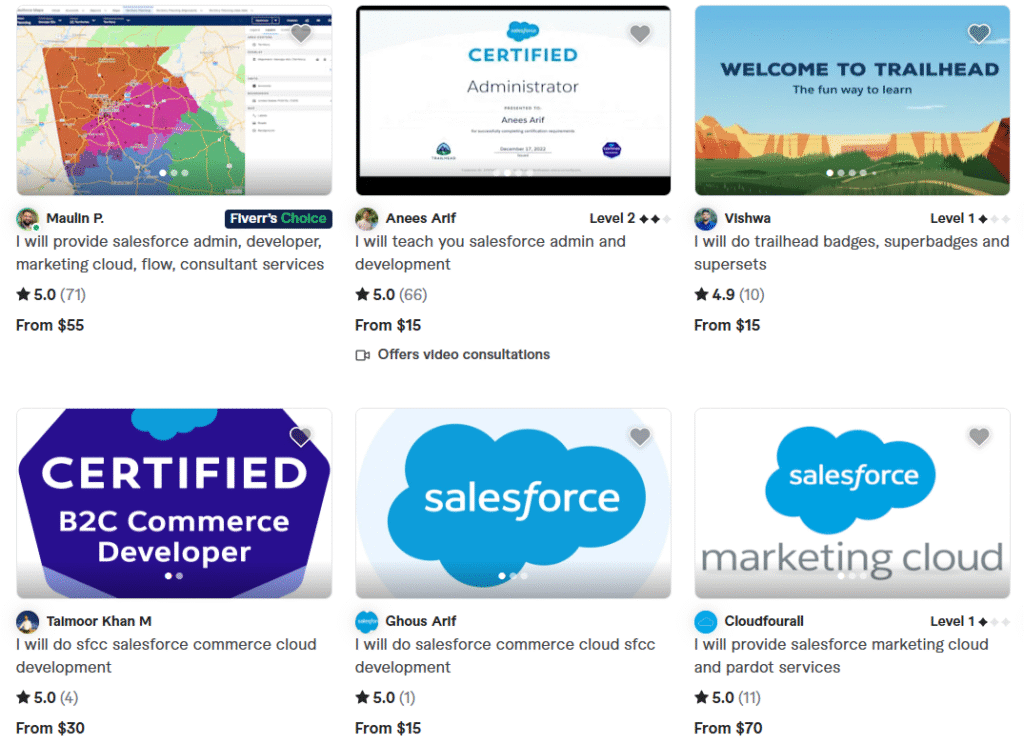
Fiverr has become a go-to platform for businesses looking to hire expert Salesforce Commerce Cloud developers on a flexible budget. You can browse developer profiles, read verified reviews, compare service packages, and hire based on your specific project needs. It’s ideal for both one-time customizations and long-term ecommerce support.
🔹 Pro Tip: Look for sellers with “Top Rated” or “Fiverr Pro” badges for trusted, high-quality service.
🔗 Explore Salesforce Commerce Cloud developers on Fiverr
2. Upwork – Professional Freelancers with Verified Work History
Upwork allows you to post your job requirements and receive proposals from qualified Salesforce developers. You can review each freelancer’s profile, skills, job success rate, and hourly rates. It’s a great platform if you’re looking for long-term collaboration or want to vet candidates through interviews.
3. Salesforce Partner Community
The Salesforce Partner Community includes certified agencies and consultants who specialize in Salesforce Commerce Cloud solutions. This is a great option if you’re looking for enterprise-level support and fully managed development teams. Most partners come with deep Salesforce expertise, including integration, performance tuning, and scalable solutions.
4. LinkedIn – Search, Connect, and Hire Directly
LinkedIn is another powerful platform to find Salesforce Commerce Cloud developers. You can search by job title, certifications, experience, and endorsements. Many developers also showcase their portfolios and previous client success stories directly on their profiles.
5. Development Agencies Specializing in Salesforce Commerce Cloud
Many boutique and enterprise-grade development agencies focus exclusively on Salesforce ecosystems. These agencies often have certified developers, project managers, and QA teams ready to handle complex ecommerce projects. Look for agencies with case studies and strong client references.
6. Tech Communities & Forums
Online communities like Stack Overflow, Salesforce Stack Exchange, GitHub, and Reddit’s r/salesforce are great places to find passionate and highly skilled developers. While these platforms aren’t hiring marketplaces, they allow you to network, identify active contributors, and reach out directly.
Bonus Tip: What to Look for in a Platform
When choosing where to hire from, consider:
- Certification and experience verification
- Client testimonials and project history
- Transparent pricing models
- Communication and availability
How Much Does It Cost to Hire a Salesforce Commerce Cloud Developer?
The cost to hire a Salesforce Commerce Cloud (SFCC) developer can vary widely depending on several key factors, including experience level, location, scope of your project, and whether you’re hiring a freelancer, an in-house developer, or a specialized agency.
1. Average Hourly Rates
- Freelancers:
Freelance Salesforce Commerce Cloud developers typically charge between $50 to $150 per hour, depending on expertise.- Junior Developers: $50–$80/hour
- Mid-Level Developers: $80–$120/hour
- Senior/Certified Experts: $120–$150+/hour
- Agencies:
Hiring a development agency with SFCC expertise may cost $100 to $200+ per hour, but you benefit from a full team (including project managers, testers, and designers).
2. Project-Based Pricing
For fixed-price projects, costs depend on complexity:
- Basic Customization or Bug Fixes: $500 – $2,000
- Medium-Sized Projects (Integrations, Theming): $3,000 – $10,000
- Full Store Development: $10,000 – $50,000+
3. Factors That Influence Cost
Several elements affect how much you’ll pay:
- Developer’s location – Developers from North America and Western Europe charge more than those in Eastern Europe, South Asia, or Latin America.
- Experience and certifications – Certified B2C Commerce Developers or SFCC Architects command higher rates.
- Project complexity – Custom features, third-party integrations, and advanced personalization increase the cost.
- Timeframe – Urgent projects may require paying a premium for faster delivery.
4. Cost Comparison: Freelancer vs Agency
| Type | Hourly Rate | Pros | Cons |
|---|---|---|---|
| Freelancer | $50–$150 | Flexible, lower cost, good for small projects | Limited support, single point of failure |
| Agency | $100–$200+ | Team expertise, full service, long-term support | More expensive, possible contract terms |
5. Where to Hire Trusted Developers
To manage your budget efficiently, consider hiring from platforms like Fiverr, where you can compare different Salesforce Commerce Cloud developers based on pricing, reviews, and experience. Fiverr offers vetted professionals with transparent pricing, helping you avoid surprise costs.
Interview Questions to Ask Salesforce Commerce Cloud Developers
Hiring the right Salesforce Commerce Cloud developer requires more than just scanning resumes. A well-structured interview will help you evaluate both technical competence and real-world problem-solving skills. Below are essential interview questions categorized to help you make an informed decision:
A. Technical Proficiency Questions
These questions assess the developer’s understanding of SFCC’s core architecture and tools:
- Can you explain the difference between a SiteGenesis and SFRA architecture in Salesforce Commerce Cloud?
- What are cartridges in SFCC, and how do they work?
- How do you implement custom business logic using controllers and pipelines?
- What’s your experience with ISML templates?
- How do you handle custom object creation and data binding in SFCC?
- What is your approach to integrating third-party APIs (e.g., payment gateways, shipping providers) into SFCC?
B. Experience-Based Questions
Evaluate their practical experience and ability to manage real-world ecommerce scenarios:
- Can you walk me through a recent SFCC project you worked on? What challenges did you face and how did you solve them?
- Have you worked with Business Manager extensively? What tasks do you commonly perform there?
- How do you manage and deploy code changes across different environments (dev, staging, production)?
- Have you implemented custom checkout flows or product recommendation engines in SFCC?
C. Problem-Solving and Optimization Questions
This helps you gauge how well they can handle performance issues, bugs, and scale requirements:
- How do you optimize site performance on SFCC?
- What debugging tools or techniques do you use within the SFCC ecosystem?
- What’s your approach to handling high-traffic events like Black Friday or Cyber Monday?
D. Soft Skills and Communication
Especially important if the role is remote or collaborative:
- How do you communicate technical decisions with non-technical stakeholders?
- How do you handle feedback or conflicting opinions on development decisions?
- Have you worked in an Agile or Scrum environment? How do you manage sprint goals?
E. Certification and Learning
To assess commitment to the platform and staying updated:
- Do you hold any Salesforce certifications (e.g., B2C Commerce Developer)?
- How do you keep up with the latest updates and best practices in Salesforce Commerce Cloud development?
Pro Tip: Beyond the answers, pay attention to how clearly and confidently the developer communicates. Clear communication is just as important as coding skills, especially in ecommerce projects where time-to-market and customer experience are critical.
Red Flags to Avoid When Hiring
Hiring the right Salesforce Commerce Cloud (SFCC) developer can make or break your e-commerce project. While there are many skilled professionals out there, it’s crucial to watch out for warning signs that could indicate a poor fit or potential issues down the road. Here are some key red flags to avoid:
1. Lack of SFCC-Specific Experience
A developer may be experienced in general web development but unfamiliar with the unique architecture and workflows of Salesforce Commerce Cloud. If they don’t have direct experience with SFCC or haven’t worked on ecommerce projects using it, that’s a major red flag.
2. No Portfolio or Case Studies
A qualified SFCC developer should be able to showcase previous work. Whether it’s a live demo, GitHub code, or case studies, the absence of a portfolio often signals inexperience or a lack of successful projects.
3. Vague or Generic Responses During Interviews
If the developer gives generic answers when you ask technical questions or can’t explain their development process clearly, they may not have the depth of knowledge required for complex SFCC builds.
4. Poor Communication Skills
Strong communication is essential, especially for remote developers. If the candidate is slow to respond, unclear in their messaging, or avoids providing updates during the hiring process, this could lead to larger issues later.
5. No Understanding of Business Manager or Cartridge Architecture
Salesforce Commerce Cloud relies heavily on Business Manager and cartridge-based development. A developer who’s unfamiliar with these concepts may struggle with even basic tasks within your e-commerce site.
6. Unrealistically Low Rates
If a developer offers significantly lower rates than others in the market, it might be tempting—but it could also reflect inexperience or lower quality work. Remember, hiring cheap can often end up being more expensive in the long run.
7. Lack of Certification or Ongoing Learning
While not always mandatory, having a Salesforce B2C Commerce Developer certification is a strong plus. If a developer hasn’t invested in certification or continued education, it may signal a lack of long-term commitment to the platform.
8. Negative Reviews or No References
Always check reviews, testimonials, or client feedback. If a developer has a history of missed deadlines, poor code quality, or lack of professionalism, these issues will likely resurface in your project as well.
Tips for Managing Your Salesforce Commerce Cloud Developer
Managing a Salesforce Commerce Cloud (SFCC) developer effectively is crucial to ensure the successful execution of your ecommerce project. Here are some practical tips to help you get the most out of your partnership with an SFCC developer:
1. Set Clear Expectations from the Start
- Define project goals and objectives: Clearly outline what you expect from the developer and what you want to achieve with your SFCC implementation, whether it’s a complete ecommerce site launch, integration with third-party systems, or optimizing performance.
- Establish deliverables and deadlines: Ensure that the developer understands key milestones and deliverables, including timelines for each phase of the project. Setting these expectations early can help avoid delays and miscommunication.
2. Communicate Regularly and Effectively
- Regular check-ins: Schedule regular meetings to review progress, address challenges, and ensure that the project stays on track. These check-ins can be weekly or bi-weekly, depending on the complexity of the project.
- Use collaborative tools: Leverage project management tools like Jira, Trello, or Asana to track progress, assign tasks, and communicate expectations.
- Foster open communication: Encourage a transparent communication environment where the developer feels comfortable discussing challenges, offering suggestions, or asking for clarification.
3. Be Available for Clarifications and Feedback
- Provide timely feedback: Give feedback on deliverables promptly so that the developer can make necessary adjustments. The quicker you respond, the less likely the project will face setbacks.
- Clarify requirements as needed: Developers may encounter aspects of the project that require further clarification or adjustments. Make yourself available for quick consultations to avoid delays due to misunderstandings.
4. Prioritize Security and Scalability
- Security best practices: Ensure that your developer is following best practices for data protection, such as encrypting sensitive customer data and complying with privacy laws (e.g., GDPR).
- Focus on scalability: Your SFCC developer should be mindful of your e-commerce store’s future growth. Ensure that the site architecture and integrations are scalable to accommodate increases in traffic and sales volume as your business grows.
5. Stay Involved in the Testing Process
- User acceptance testing (UAT): Make sure you are part of the testing process to ensure that the final product meets your needs. Test all features, including payment gateways, checkout processes, and mobile responsiveness.
- QA and performance testing: Collaborate with the developer to test for bugs, performance issues, and security vulnerabilities before going live. This will help ensure that your SFCC site functions smoothly for users.
6. Ensure Proper Documentation
- Code documentation: Make sure that your developer provides clear documentation for all custom code, integrations, and configurations. This will make it easier for future developers to maintain and update the system.
- User documentation: If necessary, request that the developer provides documentation for how to use and manage the Salesforce Commerce Cloud platform, particularly if you have an internal team that will be responsible for site maintenance.
7. Emphasize Long-Term Maintenance and Support
- Post-launch support: Make sure your developer is available for post-launch support to resolve any issues that arise after the site goes live.
- Maintenance plan: Discuss ongoing maintenance needs, including updates to the platform, security patches, and new features. Having a plan in place for regular maintenance will keep your SFCC site running efficiently.
8. Be Flexible with New Ideas and Solutions
- Encourage innovation: Developers bring expertise to the table, so be open to new ideas or suggestions that could improve the performance or functionality of your SFCC store. Sometimes the best solutions come from developers who understand the platform deeply.
- Adapt to changes: In the fast-paced world of e-commerce, new features or requirements may emerge. Be flexible in adapting to necessary changes or additional features that may enhance the customer experience or improve operational efficiency.
By managing your Salesforce Commerce Cloud developer with clear communication, defined expectations, and a focus on long-term success, you can ensure a smooth development process and a highly functional e-commerce platform. This collaborative approach will help you achieve your business goals and build a strong, scalable online presence.
Check The Lists: 5 Best Freelance Salesforce Developers for Hire
Conclusion
Hiring the right Salesforce Commerce Cloud (SFCC) developer is a critical step toward building a successful and scalable e-commerce store. With its powerful features and flexibility, SFCC offers a robust platform for growing your business, but only when implemented and managed by an expert.
By focusing on the right skills, such as expertise in Salesforce Commerce APIs, integration experience, and knowledge of SEO, you ensure that your developer can deliver the best results. While cost is an important factor, remember that quality and experience should be prioritized to avoid future roadblocks and unnecessary delays.
Take the time to carefully vet candidates, ask the right interview questions, and set clear expectations from the start. Whether you’re hiring a freelancer through platforms like Fiverr or working with a dedicated agency, choosing the best developer will lay the foundation for your store’s success.
If you’re ready to start your search, check out reputable platforms for vetted Salesforce Commerce Cloud developers and begin your journey toward creating a high-performance ecommerce experience that will set your business apart.
[helpie_faq group_id=’43’/]
